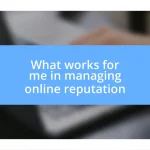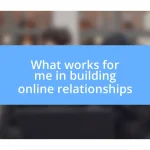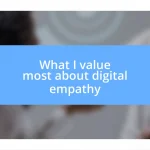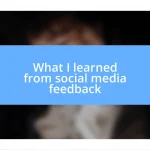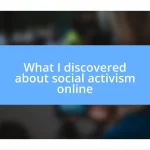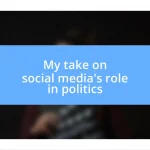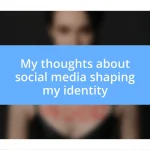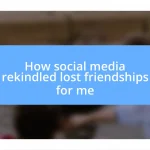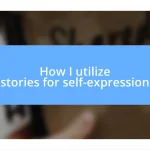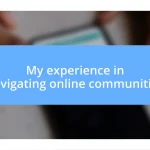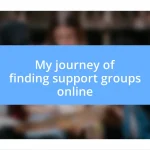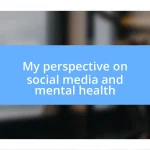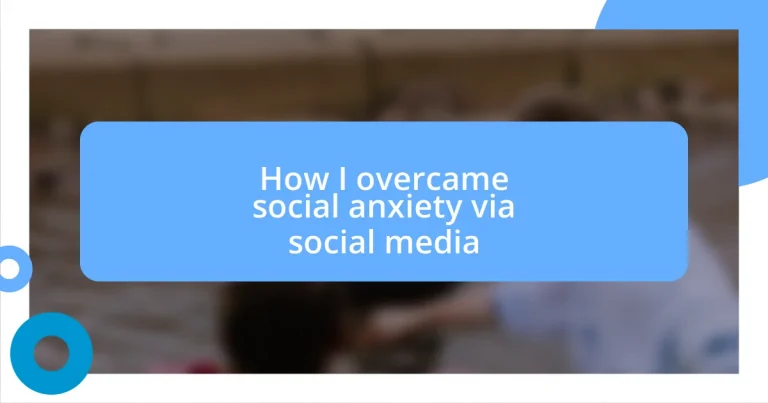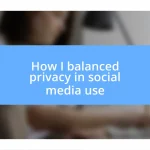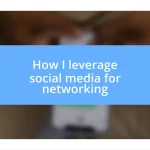Key takeaways:
- Understanding social anxiety as a common experience helps in normalizing feelings and encourages sharing struggles with others.
- Identifying personal triggers in social situations, such as crowded places and perceived judgment, aids in managing anxiety more effectively.
- Engaging in online platforms fosters connection and builds social skills in a low-pressure environment, promoting personal growth and confidence.
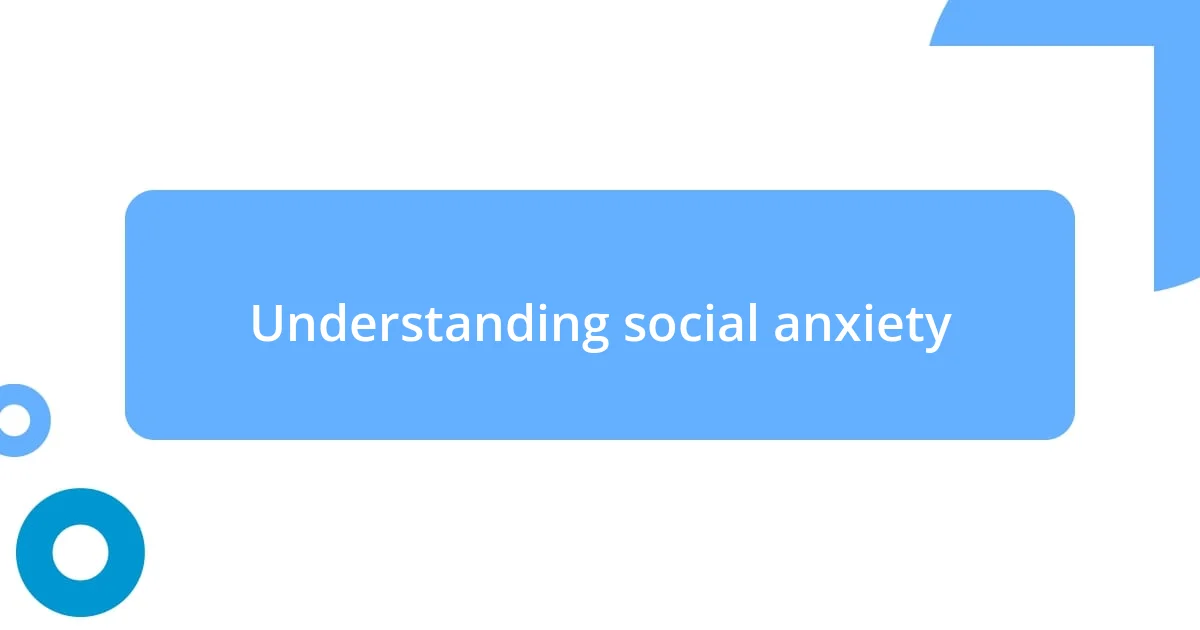
Understanding social anxiety
Social anxiety is more than just being shy; it’s a persistent fear of being judged or embarrassed in social situations. I remember standing in the corner at a party, heart racing and palms sweaty, feeling like everyone was watching my every move. Have you ever felt that overwhelming need to just disappear in a crowd?
For many, social anxiety can manifest as a constant sense of dread or overthinking. I often caught myself rehearsing conversations in my head, worrying about what to say and how it might be received. It’s exhausting to constantly second-guess yourself, isn’t it?
Understanding that social anxiety is a real and common experience helps to normalize those feelings. When I finally accepted that others might feel the same way, I began to see how crucial it is to reach out and share those fears. Have you ever talked to someone about your struggles? It can be incredibly freeing!

Identifying triggers in social situations
Identifying triggers in social situations is a crucial step in managing social anxiety. I’ve often found that certain environments or specific people amplify my feelings of unease. For instance, large gatherings tend to overwhelm me, while small groups feel more manageable. Recognizing these patterns allows me to prepare mentally for situations that may cause distress.
Here are some common triggers I’ve identified:
- Crowded places: The noise and bustling activity can be overwhelming.
- Unfamiliar settings: New environments often increase my anxiety.
- Perceived judgment: I tend to feel more anxious when I think others are evaluating me.
- Interruptions in conversation: I find it hard to regain my footing if I’m interrupted or my thoughts are disrupted.
- Social media interactions: Sometimes, online exchanges leave me feeling vulnerable, especially if I misinterpret tones or intentions.
Reflecting on these triggers helps me navigate social situations with a bit more confidence. Each time I pinpoint what affects me, I gain a better understanding of how to manage the emotional impact. It’s all about turning those intense moments into manageable experiences.
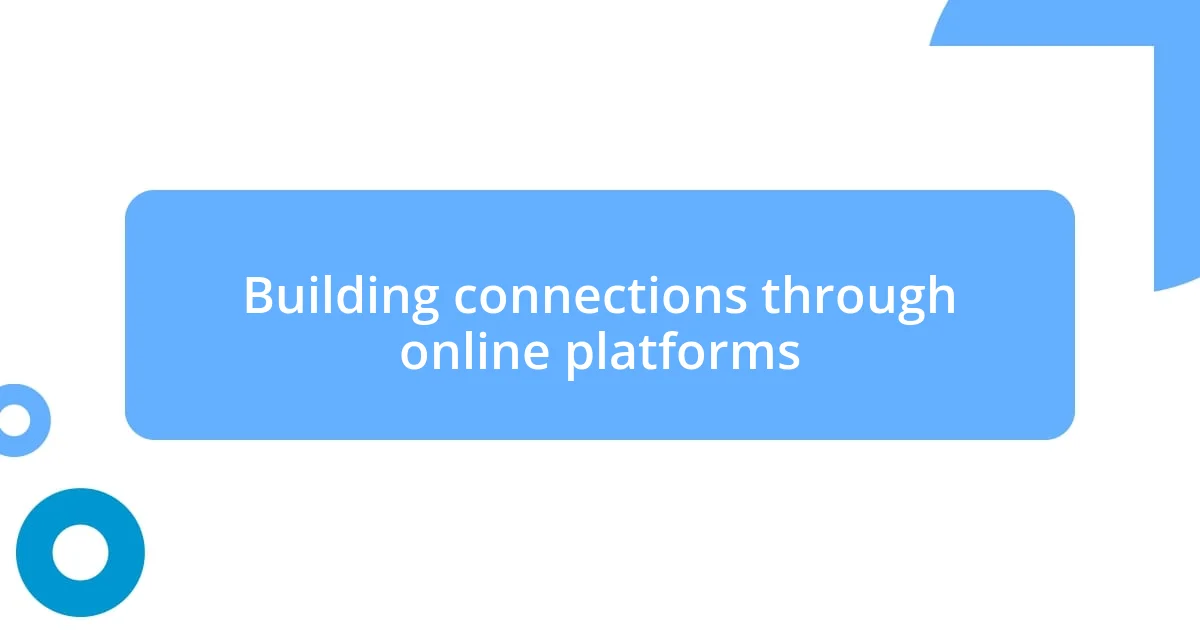
Building connections through online platforms
Building connections through online platforms can transform the way we approach our social anxieties. I remember when I first discovered social media; it felt like an escape hatch. Unlike my experiences in crowded rooms, online interactions allowed me to express myself without the immediate fear of judgment. I could curate my responses and engage at my own pace. Have you ever felt that sense of relief when you can edit your words before sharing them? It can be liberating.
Engaging in online communities also fostered a sense of belonging I desperately craved. I joined several groups focused on shared interests—like book clubs and fitness challenges. These virtual spaces became safe havens where I could interact with others without the intensity of in-person gatherings. In those moments, I realized that I was not alone in my feelings; the support and encouragement from people across the globe were empowering. How comforting it is to know that others share your interests and struggles?
Of course, it wasn’t all smooth sailing. I did face moments of doubt, especially when I posted something personal and feared the response. Yet, with each interaction, I gained confidence, learning to navigate both the positive feedback and the occasional critique. The beauty of this online platform is that it offers continual opportunities for growth and connection, reshaping how I perceive social interactions overall.
| Aspect | In-Person Interactions | Online Interactions |
|---|---|---|
| Fear of Judgment | Higher; immediate reaction | Lower; delayed response |
| Need for Preparation | Intense; rehearsing conversations | Moderate; can edit responses |
| Sense of Community | Variable; depends on setting | Stronger; diverse perspectives |
| Control Over Interaction | Limited; real-time | Enhanced; choose when to engage |
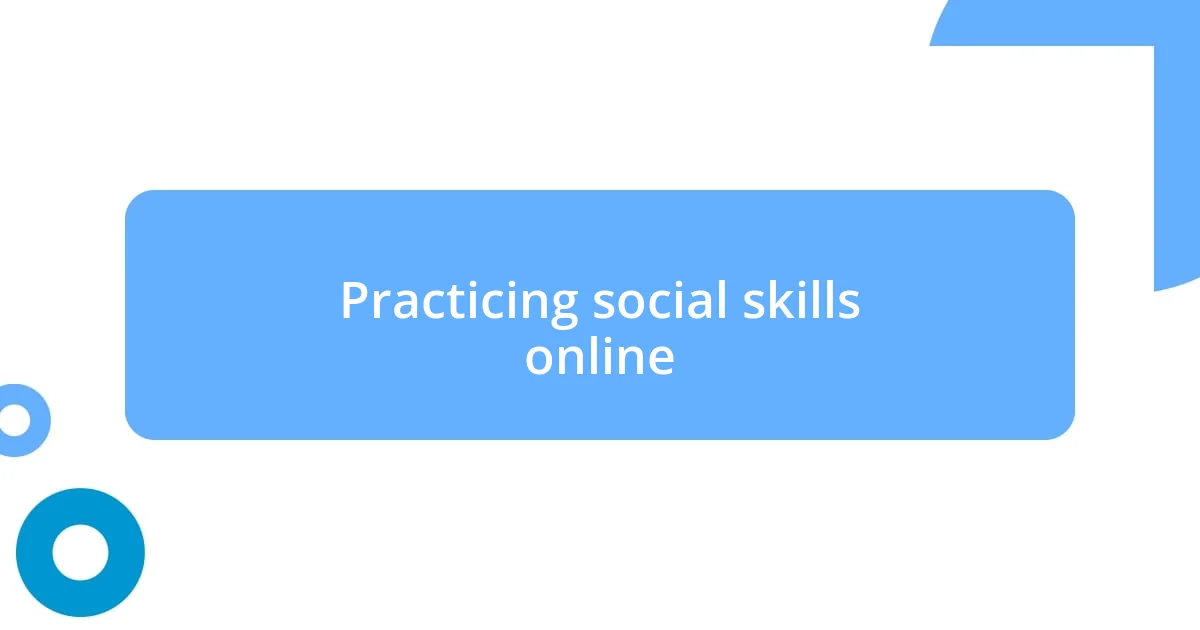
Practicing social skills online
Practicing social skills online offers unique opportunities to develop communication abilities in a low-pressure environment. For me, platforms like Twitter and Reddit became my training grounds. I remember the thrill of crafting a thoughtful comment. There’s something exhilarating about hitting “send” and waiting for the responses. Did I nail it or completely miss the mark? Over time, I found that this delay allowed me to build resilience against potential criticism.
Another experience that stood out involved joining online discussions about my favorite TV shows. I initially felt hesitant to share my thoughts, fearing they wouldn’t be well-received. But when I finally mustered the courage, the positive responses from others inspired me. It was remarkable how strangers could validate my opinions and offer their perspectives. Have you ever felt that magic of connection through shared interests? It’s like discovering a secret outlet for my thoughts.
While the online world isn’t without its challenges—like misunderstanding tone or context, which can lead to anxiety—I’ve learned to approach these interactions with curiosity rather than dread. I practice reading and responding to messages thoughtfully. Each conversation builds my confidence and sharpens my social skills. I’ve come to realize that every exchange, whether challenging or uplifting, is a stepping stone in my journey toward overcoming social anxiety.
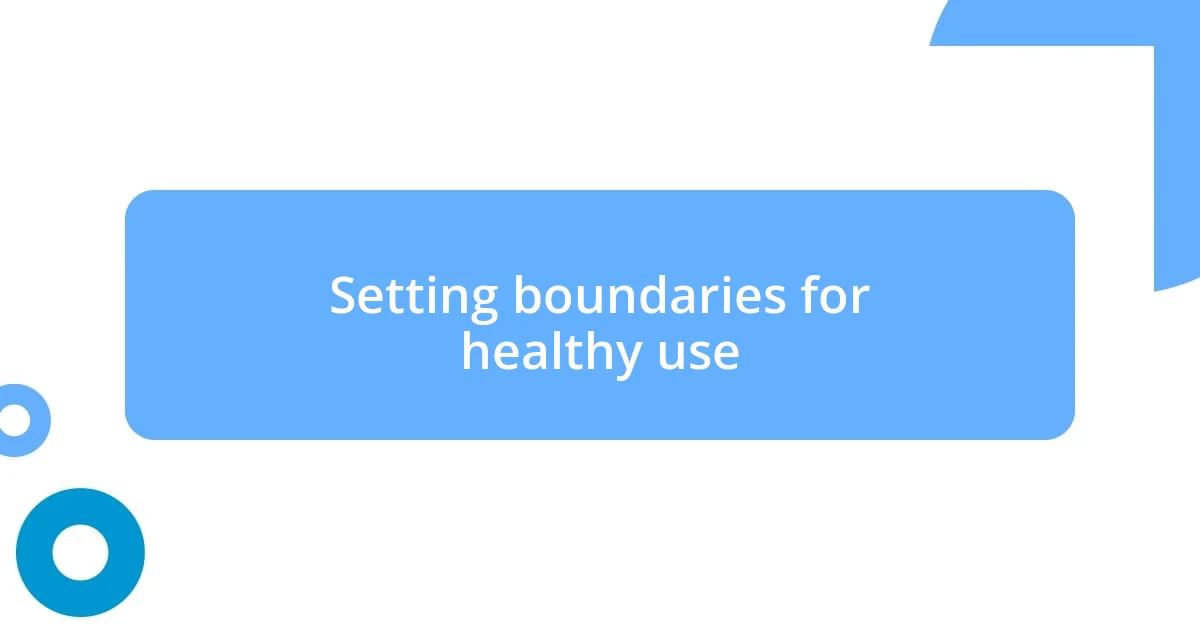
Setting boundaries for healthy use
Setting boundaries for healthy use of social media is crucial in mitigating the impacts of social anxiety. I’ve found it beneficial to define specific times for checking my accounts rather than letting notifications dictate my day. Imagine the relief of stepping away from that constant pinging—suddenly, I’m not a slave to my screen, and I’m able to focus on my thoughts and activities more clearly.
Another approach I’ve embraced is curating my feed to reflect positivity. I unfollowed accounts that triggered anxiety or negativity, replacing them with uplifting and supportive content. There’s a real power in surrounding ourselves with voices that inspire rather than discourage us. Have you noticed how certain posts can instantly lift your mood? I realized that by controlling what I consume, I felt more empowered and less anxious.
Lastly, I’ve set clear guidelines for how I engage with others online. I focus on quality over quantity, seeking meaningful conversations instead of shallow interactions. By prioritizing deeper connections, I’ve learned to appreciate the authenticity of a few thoughtful exchanges rather than feeling overwhelmed by a flood of comments. This shift has transformed my online experience, making it feel more personalized and less like a competition for attention. How refreshing it is to invest in relationships that feel genuine!
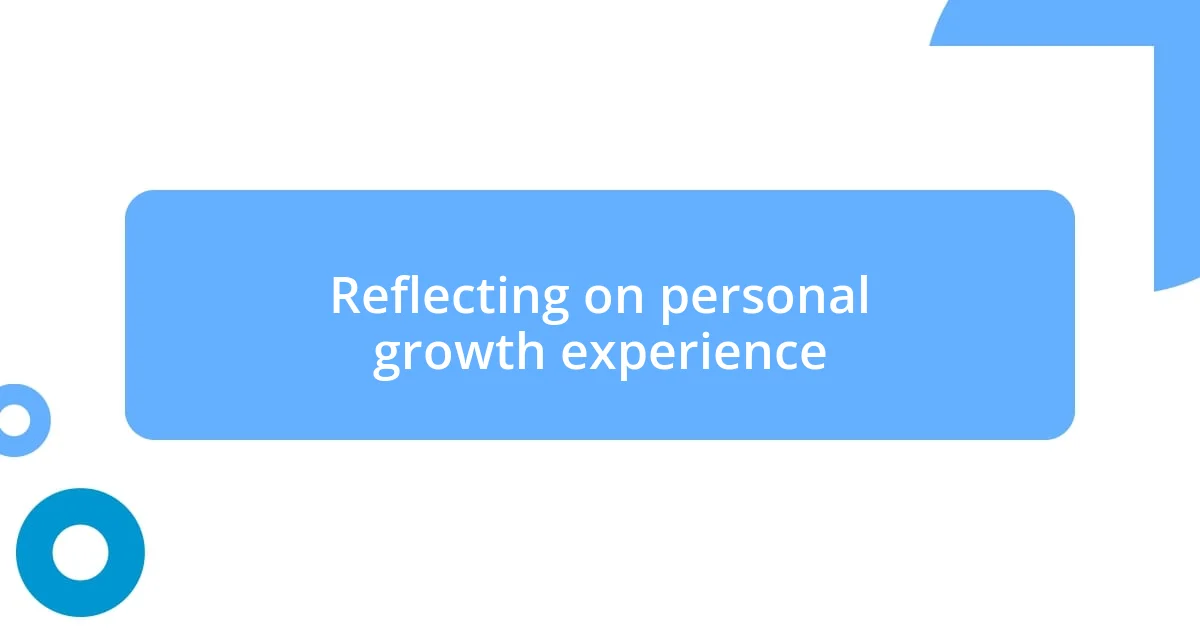
Reflecting on personal growth experience
Reflecting on my personal growth, I vividly recall the moments when I realized I was no longer paralyzed by the thought of social interactions. There was a particular day when I confidently commented in a live forum about a course I was taking. The rush of sharing my insights felt surreal; suddenly, my voice mattered. Have you ever had that moment when you realize how far you’ve come? It’s those small victories that accumulate and reshape our self-perception.
As I’ve navigated this journey, I started journaling my experiences, documenting the shifts in my feelings and thoughts. Each entry became a mirror reflecting not just my challenges but also my progress. Upon reading back, it’s astonishing to see how my anxiety began to wane with each step I took. It’s almost like piecing together a puzzle, where every effort adds clarity to the overall picture. Doesn’t it amaze you how self-reflection can unlock insights that would otherwise remain hidden?
I also learned the importance of celebrating my milestones, no matter how minor they seemed. For instance, I used to dread video calls, but one day, I smiled at myself in the camera and felt a wave of confidence wash over me. That simple act became a turning point, reinforcing the belief that I could face my fears. How often do we forget to acknowledge our achievements in our quests for improvement? Taking a moment to appreciate these breakthroughs is vital in nurturing lasting growth.
